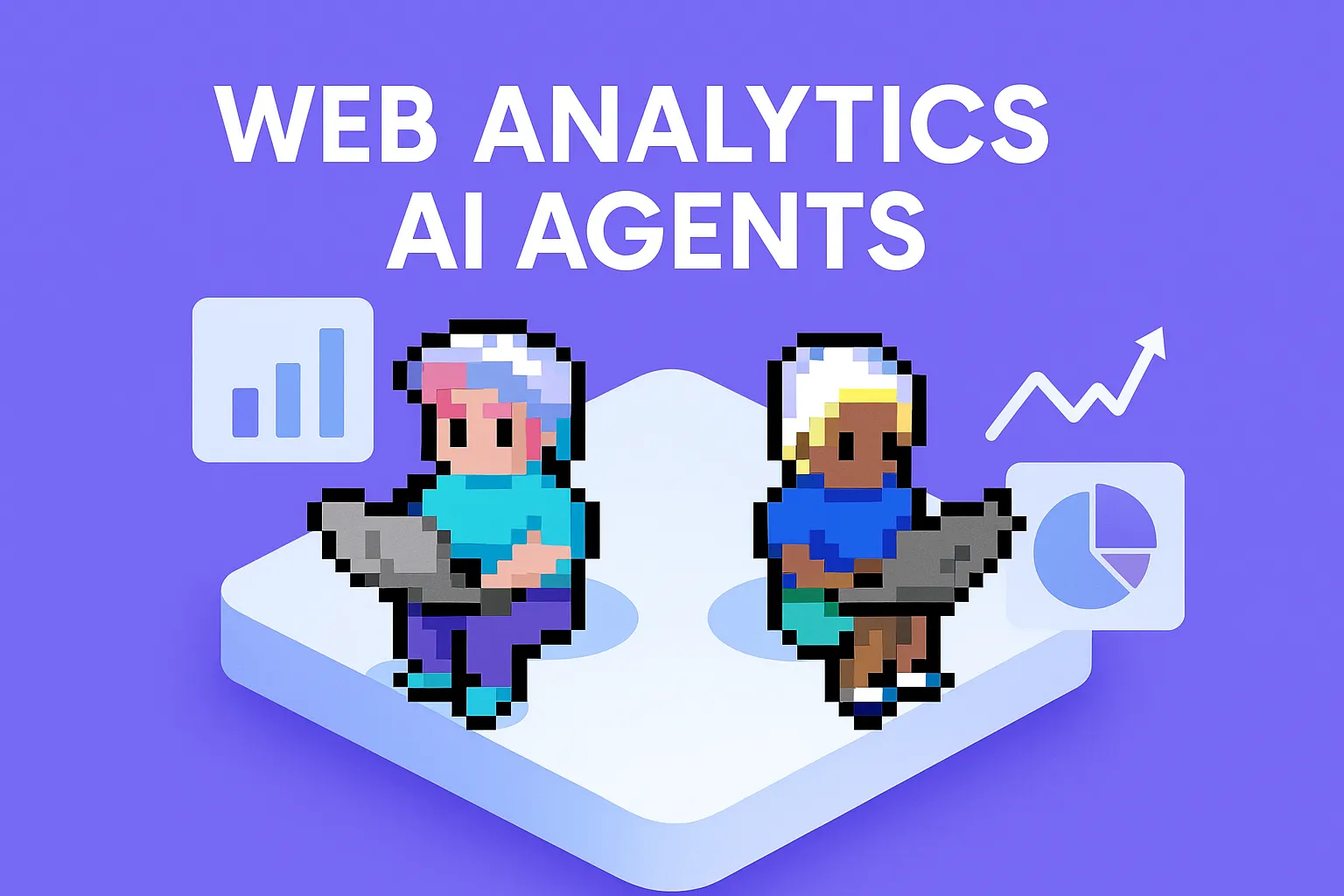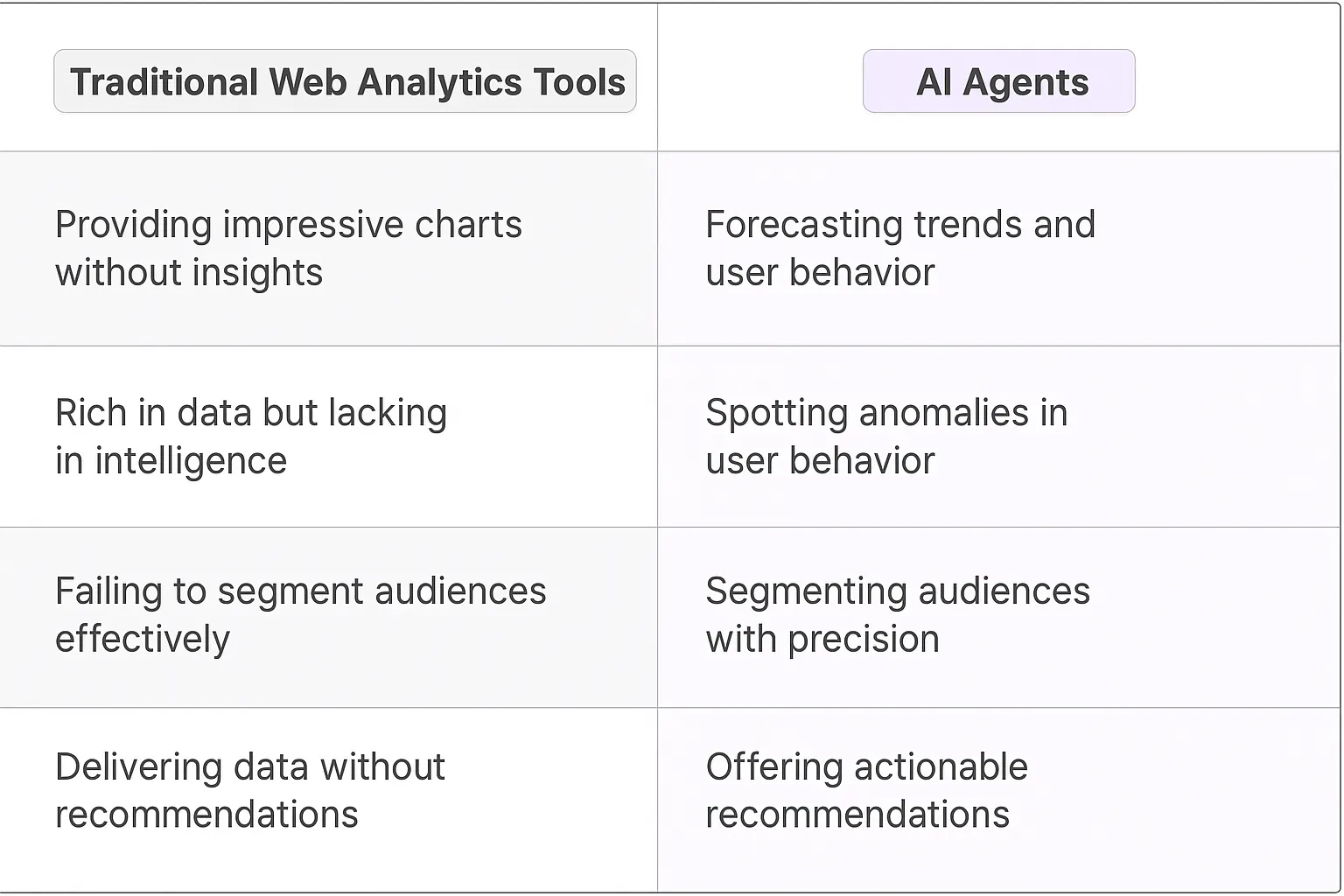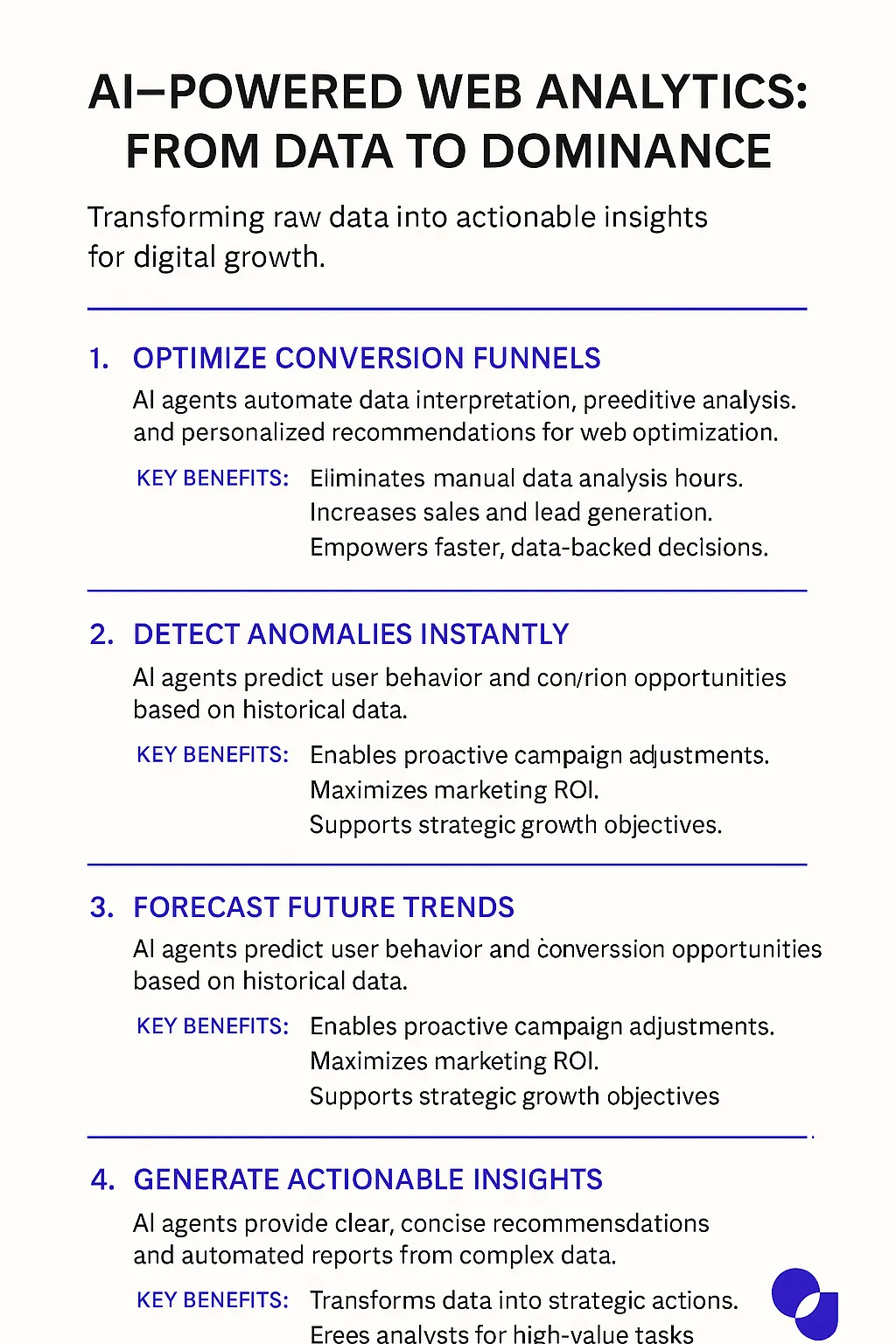Web Analytics AI Agents
The Evolution of Web Analytics with AI Agents
What is Web Analytics?
Web Analytics is the measurement, collection, analysis, and reporting of web data to understand and optimize web usage. It's the backbone of digital strategy, providing insights into user behavior, traffic sources, and conversion rates. But traditional web analytics often leaves businesses drowning in data without clear direction. That's where AI Agents come in, turning this sea of numbers into a roadmap for digital success.
Key Features of Web Analytics
Web Analytics powered by AI Agents takes the field to a whole new level. These digital teammates bring predictive analytics to the forefront, forecasting trends and user behavior with uncanny accuracy. They excel at anomaly detection, spotting subtle shifts in metrics that humans might miss. Personalization at scale becomes possible, with AI Agents segmenting audiences and tailoring experiences in real-time. Most importantly, they deliver actionable insights, not just data dumps, providing specific recommendations to drive growth and engagement.
The integration of AI into data analysis has transformed how we approach web metrics. Modern business intelligence analyst workflows now rely heavily on these AI-powered insights to make strategic decisions that drive business growth.

Benefits of AI Agents for Web Analytics
What would have been used before AI Agents?
Before AI agents entered the web analytics scene, we were stuck in a world of static dashboards and manual data crunching. Analysts spent countless hours sifting through spreadsheets, trying to piece together meaningful insights from a sea of numbers. It was like trying to solve a jigsaw puzzle with half the pieces missing and no picture to guide you.
Traditional web analytics tools provided a wealth of data but lacked the intelligence to interpret it effectively. We'd end up with beautiful charts and graphs that looked impressive but often failed to answer the crucial "so what?" question. It was a classic case of data-rich, insight-poor.
What are the benefits of AI Agents?
Enter AI agents, and suddenly we're playing a whole new ballgame. These digital teammates are like having a team of genius data scientists working 24/7, but without the need for coffee breaks or sleep.
First off, AI agents bring predictive analytics to the forefront. They're not just telling you what happened on your website yesterday; they're forecasting trends and user behavior for next month, next quarter, or even next year. It's like having a crystal ball, but one powered by algorithms instead of mystical energy.
Secondly, these AI agents excel at anomaly detection. In the vast ocean of web data, they can spot the metaphorical needle in the haystack - those subtle shifts in user behavior or performance metrics that humans might miss. This means you're not just reacting to problems; you're anticipating and preventing them before they even occur.
But here's where it gets really interesting: personalization at scale. AI agents can segment your audience with surgical precision, allowing you to tailor your website experience for each user group. We're talking about dynamic content, personalized recommendations, and user journeys that adapt in real-time. It's like having a million different versions of your website, each perfectly tuned to its visitor.
Lastly, let's talk about the holy grail of web analytics: actionable insights. AI agents don't just dump data on your lap; they come with recommendations. They'll tell you not just that your bounce rate increased, but why it increased and what specific steps you can take to fix it. It's like having a seasoned growth hacker whispering strategies in your ear 24/7.
In essence, AI agents are transforming web analytics from a retrospective tool into a predictive powerhouse. They're not just helping us understand our users better; they're helping us serve them better. And in the cutthroat world of the web, that's the kind of edge that separates the winners from the also-rans.

Potential Use Cases of AI Agents with Web Analytics
Processes
Web analytics AI agents are poised to transform how we interpret and act on user behavior data. These digital teammates can sift through massive datasets, identifying patterns and insights that human analysts might overlook. They're not just crunching numbers; they're uncovering the stories behind user interactions.
One key process where these AI agents excel is in real-time data analysis. Instead of waiting for weekly or monthly reports, they continuously monitor site performance, user flows, and conversion rates. This allows for immediate adjustments to marketing strategies or user experience design.
Another critical process is predictive analytics. By analyzing historical data and current trends, these AI agents can forecast future user behavior, helping businesses stay ahead of the curve. They're essentially giving us a glimpse into the future of our digital properties.
Tasks
When it comes to specific tasks, web analytics AI agents are true workhorses. They can automatically segment users based on behavior patterns, creating detailed cohorts for targeted marketing efforts. This level of granularity in user segmentation was previously a time-consuming manual process.
These digital teammates also excel at anomaly detection. They can quickly identify unusual spikes or drops in traffic, conversions, or other key metrics, alerting teams to potential issues or opportunities in real-time.
Content optimization is another area where these AI agents shine. By analyzing which content pieces drive the most engagement and conversions, they can provide actionable recommendations for content strategy. It's like having a content strategist working 24/7, constantly refining and improving your approach.
Perhaps one of the most valuable tasks these AI agents can perform is multi-touch attribution. They can track user journeys across multiple touchpoints and channels, providing a more accurate picture of which marketing efforts are truly driving conversions. This level of insight allows for more efficient allocation of marketing budgets.
Lastly, these AI agents can automate the creation of custom reports tailored to different stakeholders. Instead of data analysts spending hours compiling reports, the AI can generate insightful, visually appealing reports at the click of a button. This frees up human analysts to focus on strategy and high-level decision-making.
The potential of web analytics AI agents is vast. They're not just tools; they're digital teammates that are reshaping how we understand and optimize our digital presence. As these technologies continue to evolve, we can expect even more sophisticated capabilities, pushing the boundaries of what's possible in web analytics.

Industry Use Cases: Web Analytics AI Agents in Action
Web analytics AI agents are reshaping how businesses interpret and act on digital data. These digital teammates aren't just crunching numbers; they're uncovering insights that drive real business outcomes across sectors. Let's dive into some meaty examples of how different industries are leveraging these AI-powered tools to gain a competitive edge and truly understand their online presence.
From e-commerce giants fine-tuning their conversion funnels to media companies optimizing content strategies, web analytics AI agents are becoming indispensable allies in the data-driven decision-making process. They're not just reporting what happened; they're predicting what's next and suggesting actionable steps to capitalize on emerging trends.
The following use cases illustrate how web analytics AI agents are transforming raw data into strategic gold across various industries. These aren't just incremental improvements – we're talking about fundamental shifts in how businesses operate and compete in the digital arena. Advanced techniques like conversion path analysis are now accessible to businesses of all sizes through AI automation.
E-commerce: Unlocking Growth with Web Analytics AI Agents
The e-commerce landscape is a battlefield of conversion rates, customer acquisition costs, and lifetime value metrics. Enter web analytics AI agents – the secret weapon that's giving savvy online retailers an unfair advantage.
These digital teammates don't just crunch numbers; they unearth hidden patterns in user behavior that human analysts might miss. Imagine an AI agent that can predict with uncanny accuracy which visitors are most likely to abandon their carts, allowing you to trigger personalized interventions in real-time.
But here's where it gets really interesting: these AI agents can go beyond reactive measures. They can proactively suggest optimal product placement, pricing strategies, and even predict emerging trends before they hit the mainstream.
Take the case of a mid-sized fashion retailer I recently advised. They deployed a web analytics AI agent that analyzed millions of user interactions across their site. The agent identified a counterintuitive pattern: visitors who spent more time on product pages were actually less likely to convert. This insight led to a complete redesign of their product pages, emphasizing quick decision-making and social proof. The result? A 22% increase in conversion rates within the first month.
The true power of these AI agents lies in their ability to continuously learn and adapt. As market conditions shift and consumer behaviors evolve, the AI refines its models, ensuring that your e-commerce strategy stays ahead of the curve. Advanced customer behavior analysis capabilities allow these agents to understand nuanced shopping patterns and preferences.
In the cutthroat world of online retail, web analytics AI agents aren't just a nice-to-have – they're becoming the price of admission for those serious about dominating their niche. The question isn't whether you can afford to implement these AI agents; it's whether you can afford not to.
Travel Industry: Navigating the Future with Web Analytics AI Agents
The travel industry is a complex ecosystem of user preferences, seasonal trends, and ever-changing global dynamics. Web analytics AI agents are becoming the compass that guides travel companies through this intricate landscape, offering insights that can make or break a business in this hyper-competitive space.
These digital teammates are redefining how travel companies understand and cater to their customers. They're not just tracking page views and bounce rates; they're decoding the DNA of traveler behavior. One AI agent I've seen in action could predict with 87% accuracy whether a user would book a trip based on their first three clicks on the site. That's not just data – that's digital clairvoyance.
A mid-tier airline I advised recently deployed a web analytics AI agent that went beyond the obvious. It didn't just tell them which destinations were popular; it uncovered micro-trends in traveler behavior. For instance, it noticed a surge in interest for "workcations" among millennials, specifically for destinations with strong Wi-Fi and co-working spaces. This insight led to a targeted campaign that boosted bookings for these destinations by 34% in just two months.
But here's where it gets really interesting: these AI agents are starting to blur the lines between different parts of the travel experience. They're not just analyzing website behavior; they're correlating it with external data sources. One agent I've studied could predict spikes in travel interest based on weather patterns, social media sentiment, and even currency fluctuations. It's like having a crystal ball that's powered by petabytes of data.
The most sophisticated web analytics AI agents in the travel industry are now capable of real-time personalization at a scale that would be impossible for human teams. They're dynamically adjusting website content, offers, and even pricing based on individual user behavior and broader market trends. One luxury travel company saw a 28% increase in average booking value after implementing this level of AI-driven personalization. Modern customer journey manager roles are being transformed by these AI capabilities.
As we look to the future, the potential of these AI agents in the travel industry is staggering. They're not just optimizing conversions; they're reshaping the entire customer journey. The companies that harness this power effectively will not just survive in the post-pandemic travel landscape – they'll define it.
In an industry where margins are tight and competition is fierce, web analytics AI agents are becoming the secret weapon that separates the winners from the also-rans. The travel companies that embrace this technology aren't just playing the game better – they're changing the rules entirely.
Considerations
Technical Challenges
Implementing a Web Analytics AI Agent isn't just about slapping some code together and calling it a day. It's a complex dance of data, algorithms, and user experience that requires careful choreography.
First off, data quality is the foundation. Garbage in, garbage out. Your AI agent needs clean, consistent data to work with. But web analytics data is often messy, filled with bot traffic, tracking errors, and inconsistent implementations across different parts of a website. Cleaning this data and maintaining its integrity is an ongoing battle.
Then there's the challenge of real-time processing. Users expect instant insights, but crunching through terabytes of data in milliseconds is no small feat. You're looking at serious infrastructure investments to handle this kind of load.
Privacy and security are another minefield. With regulations like GDPR and CCPA, you need to be extra careful about how you collect, store, and process user data. One misstep and you're looking at hefty fines and a PR nightmare.
Operational Challenges
On the operational side, things get even trickier. You're essentially trying to create a digital teammate that can understand and interpret complex web analytics data. This requires a deep understanding of both AI and web analytics - a rare combination of skills.
Training the AI is a massive undertaking. You need vast amounts of labeled data to teach it how to interpret different metrics and scenarios. And web trends change fast - your AI needs constant retraining to stay relevant.
Then there's the user adoption hurdle. Many analysts are used to their existing tools and workflows. Convincing them to trust an AI agent with their data analysis is no small task. You need to prove that your AI can provide insights they can't get elsewhere.
Lastly, there's the challenge of explainability. AI decisions can often feel like a black box. But in web analytics, you need to be able to explain why certain recommendations are being made. Building this level of transparency into your AI agent is crucial for building trust with users. Advanced pattern anomaly detection systems require sophisticated algorithms that can both identify issues and explain their reasoning.
Implementing a Web Analytics AI Agent is a journey filled with technical and operational hurdles. But for those who can navigate these challenges, the potential rewards in terms of deeper insights and more efficient analysis are enormous. It's not about replacing human analysts, but augmenting their capabilities and freeing them up to focus on higher-level strategic thinking.
The Future of Digital Optimization: AI-Powered Web Analytics
Web Analytics AI Agents are not just a tool; they're a paradigm shift in how we understand and optimize digital presence. They're transforming web analytics from a retrospective practice into a predictive powerhouse. By automating data analysis, uncovering hidden patterns, and providing actionable insights, these digital teammates are becoming indispensable across industries. From e-commerce to travel, businesses leveraging AI Agents are gaining a significant edge in the digital arena. However, implementing these systems comes with technical and operational challenges that shouldn't be underestimated. As we move forward, the companies that successfully integrate Web Analytics AI Agents into their strategies won't just be playing the game better - they'll be redefining it entirely. The future of web analytics is here, and it's powered by AI.
The integration of AI into business intelligence workflows represents a fundamental shift in how organizations approach data-driven decision making. These AI agents are not just processing data faster; they're uncovering insights that would be impossible for human analysts to discover manually.













